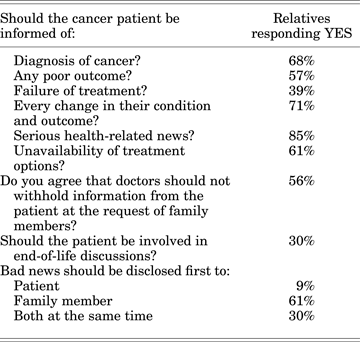This is in reference to the article published in the August 23, 2012 issue of your journal by Yoshida and colleagues entitled “Practices and Evaluations of Prognostic Disclosure for Japanese Cancer Patients and Their Families from the Family's Point of View.” It is interesting to notice the cultural similarities across different domains in Asia. We will soon be presenting the results of our own study at the 2013 annual meeting of the American Society of Clinical Oncology (abstract No. 9568, “Breaking Bad News: Comparison of Perspectives of Middle Eastern Cancer Patients and Their Relatives,” Jamal Zekri et al., Journal of Clinical Oncology, 31 (suppl.) [2013]). In our study, we interviewed 102 family members of cancer patients in Saudi Arabia. Similar to the report by Yoshida et al., family members and caretakers were in most cases averse to the idea of informing the patient about any potential adverse outcome of their illness or possible failure of their treatment, and would not even mention the term “chemotherapy” in front of the patient. Moreover, family members also seemed opposed to the idea of involving the patient in the end-of-life decision-making process (Table 1).
Table 1. Questions to cancer patients' relatives' and the percentage of YES responses

We agree with Yoshida and colleagues that further research should explore the reasons for such paternalistic attitudes acquired by relatives of cancer patients in Asian cultures as well as the cancer patients' attitude toward this paternalistic approach. This would aid in better communication and understanding of the perspectives of patients and their caregivers, and help in breaking barriers to provision of high-quality end-of-life care.



